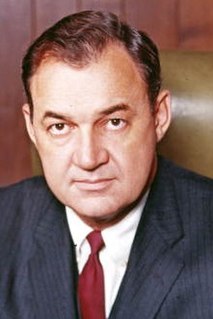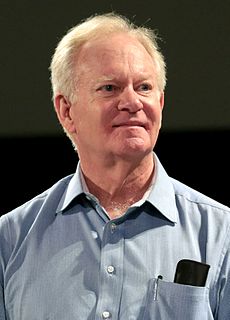
The United States Senate elections, 1968 were elections for the United States Senate which coincided with the presidential election. Although Richard Nixon won the presidential election narrowly, the Republicans picked up five net seats in the Senate. Republicans would gain another seat after the election when Alaska Republican Ted Stevens was appointed to replace Democrat Bob Bartlett.

The 1964 United States Senate elections coincided with the election of President Lyndon B. Johnson by an overwhelming majority, to a full term. His Democratic Party picked up a net two seats from the Republicans. As of 2019, this is the last time either party has had a two-thirds majority in the Senate, which would have hypothetically allowed the Senate Democrats to override a veto, convict and expel certain officials, or invoke cloture without any votes from Republicans. The Senate election coincided with Democratic gains in the House in the same year.

Edward Najeeb Basha Jr. was the Chairman & CEO of Bashas', Inc., a grocery store chain in Arizona. His father, Eddie Basha Sr., and his uncle, Ike Basha, founded Bashas' in 1932. The first store under the Bashas' banner was opened in Chandler, Arizona.

The Louisiana gubernatorial election of 1995 was held on November 18, 1995 to elect the Governor of Louisiana.

United States gubernatorial elections were held on November 2, 2010 in 37 states and two territories. As in most midterm elections, the party controlling the White House lost ground. Democrats did take five governorships from the Republicans, and Republicans took 11 governorships from the Democrats. An independent won one governorship previously held by a Republican. A Republican won one governorship previously held by an independent. Republicans held a majority of governorships for the first time since before the 2006 elections. One state, Louisiana, had no election for governor, but did feature a special election for lieutenant governor.

The Florida gubernatorial election of 1966 took place on November 8, 1966. During the primary election, the results from the Democratic Party was close among three of the four candidates. Thus, the top two Democrat candidates – incumbent Governor of Florida William "Haydon" Burns and Mayor of Miami Robert King High – competed in a runoff election on May 24, 1966. In an upset outcome, Robert King High was chosen over W. Haydon Burns as the Democratic Gubernatorial nominee. In contrast, the Republican primary was rather uneventful, with businessman Claude Roy Kirk Jr. easily securing the Republican nomination against Richard Muldrew. In the general election, Claude Kirk won by a margin of 55.13%-44.86% against Robert King High, becoming the first Republican Governor of Florida since the Reconstruction Era.

The 2010 Wisconsin gubernatorial election took place on November 2, 2010, to elect the Governor and Lieutenant Governor of Wisconsin. The 2010 Wisconsin partisan primary on September 14 determined which candidates advanced to the general election.

The Arizona gubernatorial election of 2010 was held on November 2, 2010 to elect the Governor of Arizona. Incumbent Republican Jan Brewer ran for a full term. Party primaries were held on August 24, 2010. Jan Brewer won a full term, defeating Attorney General Goddard 54% to 42%.

The 2014 Arizona gubernatorial election was held on November 4, 2014, to elect the Governor of Arizona, concurrently with elections to the United States Senate in other states and elections to the United States House of Representatives and various state and local elections.

The 1990 Arizona gubernatorial election took place on November 6, 1990 for the post of Governor of Arizona. Republican Fife Symington defeated the Democratic nominee and Mayor of Phoenix Terry Goddard. Because no candidate received a majority of votes, a runoff election was held later on February 26, 1991, which Symington also won. This is the only election where Arizona used a runoff election.

The 1978 Arizona gubernatorial election took place on November 7, 1978 for the post of Governor of Arizona. Democrat Bruce Babbitt defeated Republican nominee Evan Mecham. Babbitt was the former Attorney General of Arizona, but after the death of Governor Wesley Bolin, Babbit became governor. Bolin himself ascended to office from the position of Secretary of State, meaning his replacement, Rose Mofford was not eligible to the office as she was not elected. This drama of exchanging office would continue after Babbitt's term came to an end, as Mofford would become governor and succeeded Evan Mecham, Babbitt's challenger, in 1988.

A general election was held in the U.S. state of Arizona on November 4, 2014. All of Arizona's executive officers were up for election as well as all of Arizona's nine seats in the United States House of Representatives. Primary elections were held on August 26, 2014.

The 2018 Arizona gubernatorial election took place on November 6, 2018, to elect the governor of Arizona, concurrently with the election of Arizona's Class I U.S. Senate seat, as well as other elections to the United States Senate in other states and elections to the United States House of Representatives and various state and local elections.

The 1936 Arizona gubernatorial election took place on November 3, 1936. Incumbent Governor Benjamin Baker Moeur ran for reelection, but he was defeated in the Democratic primary by former judge of the Maricopa County Superior Court Rawghlie Clement Stanford.

The 1964 Arizona gubernatorial election took place on November 3, 1964. Incumbent Governor Paul Fannin decided not to run for reelection to a fourth term as governor, instead deciding to successfully run for the United States Senate when incumbent U.S. Senator Barry Goldwater decided to run for President of the United States.

The 1966 Arizona gubernatorial election took place on November 8, 1966. Incumbent Governor Samuel Pearson Goddard ran for reelection to a second term as Governor, narrowly winning the Democratic Party nomination as he was challenged by Justice of the Peace Norman Green.
The 2020 United States Senate special election in Arizona will be held on November 3, 2020. Following the death of Republican U.S. Senator John McCain on August 25, 2018, Governor Doug Ducey was required by Arizona law to appoint a Republican to fill the vacancy in McCain's Senate seat. In September 2018, Ducey appointed former U.S. Senator Jon Kyl to fill McCain's seat until after the Special Election of November 2020, which will determine who will serve the remainder of the term until January 2023. Kyl did not complete his interim appointment, and resigned on December 31, 2018. On December 18, 2018, Ducey announced that outgoing U.S. Representative Martha McSally would be appointed to fill the seat following Kyl's resignation. McSally was sworn in as Arizona's junior senator on January 3, 2019. She had been the Republican nominee for Arizona’s Class I U.S. Senate seat in 2018, but lost that race to Democrat Kyrsten Sinema.

























